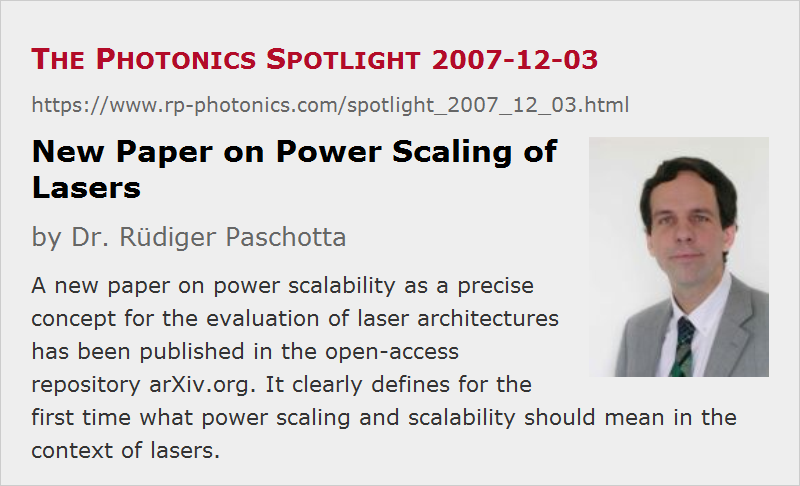New Paper on Power Scaling of Lasers
Posted on 2007-12-03 as a part of the Photonics Spotlight (available as e-mail newsletter!)
Permanent link: https://www.rp-photonics.com/spotlight_2007_12_03.html
Author: Dr. Rüdiger Paschotta, RP Photonics Consulting GmbH
Abstract: A new paper on power scalability as a precise concept for the evaluation of laser architectures has been published in the open-access repository arXiv.org. It clearly defines for the first time what power scaling and scalability should mean in the context of lasers.

Ref.: “Power scalability as a precise concept for the evaluation of laser architectures” in arXiv.org, see arXiv:0711.3987v1; encyclopedia article on power scaling of lasers
This week I published the above mentioned paper in the open-access repository arXiv.org. It is truly amazing that even though the term “power scaling” has been used for decades in the area of laser technology, this paper is the first (apart from my encyclopedia article) to give a solid definition of power scaling and scalability. (Anybody not believing this is kindly asked to provide me with a reference proving the opposite.) The motivation of that work is not only that it is very advisable to use clearly defined terms (rather than vague or even meaningless buzzwords) in science and technology, but also that serious thinking with that concept in mind can inspire a lot of useful thoughts, as common issues of high power lasers appear in a new light. In other areas of technology, such as computing, data storage, communications, and manufacturing, that lesson has been learned much earlier than in laser technology.
In very brief terms:
- I recommend not to use the term “power scaling” just for some measure to squeeze somewhat more power out of a laser (even though sadly this has become very common). True scaling is more specific: it is the application of a systematic, well-defined and repeatable scaling procedure to turn one working laser design into another one with higher output power – without using additional inventions and without making any of the main challenges more severe. Precise and practical criteria for power scaling are given in the paper.
- The idea is certainly not to dismiss anything which is not true scaling. In some sense, even the opposite may be supported: the pure application of a systematic procedure, avoiding inventive steps, is not what we call creative work. However, it can be very creative and productive to recognize or arrange a situation where true scaling is possible.
There are, of course, plenty of reasons to hate this paper:
- Those who abused the term “power scaling” in the past, and those who used the term “scalable laser architecture” for their favorite type of laser, may not like to be told that this was and is not appropriate.
- It may be hard to get rid of the feeling that “scalability” is a kind of quality label which has to be defended for a particular laser under any circumstances.
- Even those who have nothing to lose may resist changes in thinking. Sadly, this is common even in science.
Anyway, I hope the paper will be useful for many. An aspect which should help is the open-access nature of the arXiv repository.
This article is a posting of the Photonics Spotlight, authored by Dr. Rüdiger Paschotta. You may link to this page and cite it, because its location is permanent. See also the RP Photonics Encyclopedia.
Note that you can also receive the articles in the form of a newsletter or with an RSS feed.
Questions and Comments from Users
Here you can submit questions and comments. As far as they get accepted by the author, they will appear above this paragraph together with the author’s answer. The author will decide on acceptance based on certain criteria. Essentially, the issue must be of sufficiently broad interest.
Please do not enter personal data here; we would otherwise delete it soon. (See also our privacy declaration.) If you wish to receive personal feedback or consultancy from the author, please contact him e.g. via e-mail.
By submitting the information, you give your consent to the potential publication of your inputs on our website according to our rules. (If you later retract your consent, we will delete those inputs.) As your inputs are first reviewed by the author, they may be published with some delay.
 |



If you like this page, please share the link with your friends and colleagues, e.g. via social media:
These sharing buttons are implemented in a privacy-friendly way!